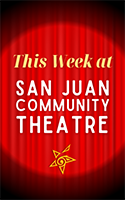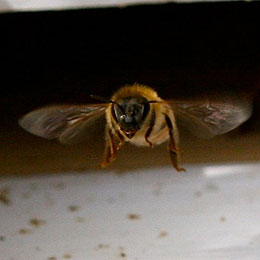Take care of our honey bees on San Juan Island!
Posted May 2, 2012 at 6:50 am by Ian Byington
If you saw “Vanishing of the Bees” you’re already thinking about the longterm implications of what it means for humans if the bees disappear, but in the meantime, we have a chance to look after the bees here on the island. Here’s a special report from Cyndi Brast, who is doing graduate work in entomology, here on San Juan Island:
Ongoing reliance on pesticides and herbicides has created serious implications for terrestrial and marine habitats. Many of us are aware of these implications and conscientious of the need to make changes. Today, the urgency for these changes became personal to me as a beekeeper when I noticed my dying honey bees, possibly exposed to a neighbor’s herbicidal lawn treatment.
Early spring is challenging for bees. With cool, wet weather and few nectar sources available, they may be competing for the rights to those dandelions blooming in your front yard. Something as innocuous as a weed may provide the first drops of sustenance for worker bees to bring back for the queen and larvae. Today, I watched several of my bees return to the hive with difficulty. Some seemed disoriented and were grooming excessively, as if trying to clean an unseen substance off their bodies. Although there is no way to know with certainty what caused this, I became concerned it was from a chemical exposure.
Honey bee workers forage from 28-79 square miles. Encountering the most risk at this stage of their life, they set out to collect pollen, nectar, and water on their venture outside the hive. During these flights, they may encounter environmental toxins the beekeeper may never discover. Some toxins cause direct and immediate mortality, while others accumulate over time in the wax as the bees collect tainted food supplies, storing them in the hive. Pollen and nectar brought back are fed to the queen and larvae. Eventually the entire colony may weaken and die.
I’m calling on anyone who cares about protecting our natural resources, including our bees. Products you use in your yard and garden can “bee” harmful. Safer alternatives exist to chemicals that contaminate our environment. Ask the county council to defend the Clean Water Act and its protections for our water. Become involved in the Critical Areas Ordinance and Shoreline Management update because our food and water ecosystems are at risk.
You can support the San Juan Update by doing business with our loyal advertisers, and by making a one-time contribution or a recurring donation.
Categories: Around Here











No comments yet. Be the first!
By submitting a comment you grant the San Juan Update a perpetual license to reproduce your words and name/web site in attribution. Inappropriate, irrelevant and contentious comments may not be published at an admin's discretion. Your email is used for verification purposes only, it will never be shared.